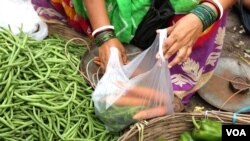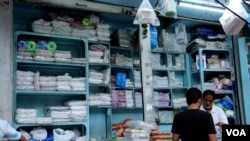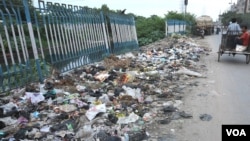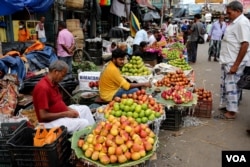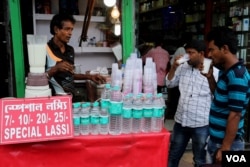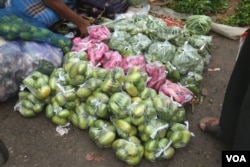Thursday afternoon in Kolkata, India, fruit seller Tanvir Alam sat behind a basket of mangos on the sidewalk of a busy street, saying the nationwide ban on single-use plastic bags that goes into effect Friday, would hurt business.
“I do not know now what I will use to pack my fruits when there is a ban on thin plastic bags from tomorrow [July 1],” Alam told VOA Thursday.
India last year banned the use of bags made of plastic less than 75 microns thick. Market vendors and shopkeepers, though, are still using such bags.
“If we cannot use plastic bags, paper bags are the next available option for us. In the market, there are stronger paper bags, which are used by big shops. But I cannot afford to use those costly bags for my business on the footpath,” Alam said.
“One stronger paper bag that can carry 2 kilograms of mango will cost at least 8 rupees. But paying 8 rupees [$ 0.10] I can buy at least 25 plastic bags.”
Some market customers said plastic bags are convenient and useful.
“Every time carrying cloth bag from home is no more our culture for a long time. We prefer that the sellers provide bags for us. Plastic bags are cheap, they come almost free with the goods,” said a 65-year-old carpenter.
Officially announcing the single-use plastic ban last week, India’s Ministry of Environment and Forests released a list of the single-use plastic items to be banned.
The list of the banned single-use plastic items includes plastic cups, plates, cutlery, ice cream sticks, candy sticks, straws, wrapping and polystyrene (thermocol/Styrofoam).
In a recent statement, India’s Central Pollution Control Board asked people to switch to cotton and jute bags, clay cups, bamboo or wooden cutlery and other items made of biodegradable materials. People criticizing the latest ban say that the alternatives are either not abundantly available or very expensive.
The Indian government said in April the country was generating 3.5 million metric tons of plastic waste annually. However, the New Delhi-based nonprofit research group Centre for Science and Environment estimates the figure should be higher.
In May 2018, Prime Minister Narendra Modi said in an address that India will eliminate all single-use plastic in the country by the end of 2022.
“The choices that we make today will define our collective future. The choices may not be easy. But through awareness, technology and a genuine global partnership, I am sure we can make the right choices. Let us all join together to beat plastic pollution and make this planet a better place to live,” Modi said.
In an article in The Guardian newspaper, Erik Solheim, former head of U.N. Environment Program, wrote in June 2018, “Let there be no doubt: we are on edge of a plastic calamity.”
Praising India’s initiative, though, he wrote again in 2018, “They have shown that political motivation, turned into practical action, can inspire the world and ignite real change.”
Welcoming the ban, Anoop Kumar Srivastava, founder of the Foundation for Campaign Against Plastic Pollution, told VOA the ban by the Indian government will pave the way for a reduction in plastic pollution in the country and eventually eliminate it.
“However, enforcement of the ban on single-use plastics will be challenging in India and will need to be coupled with a campaign to bring about behavioral change among the people. Awareness needs to be created about how single-use plastics harm human health and also the impact on the environment, which will adversely affect the future generations,” Srivastava said.
“This would reduce the demand for single-use plastics and help in the enforcement of the ban. At the same time, strict action would need to be taken against those who continue to produce banned items,” he said.
Anyone found violating the single-use plastic ban will be jailed for five years or fined more than 100,000 rupees ($1,265). Special control rooms will be set up to monitor and ensure enforcement of the ban at national and state levels, a statement from the environmental ministry read.
Yet, a vegetable seller on a sidewalk market said it is difficult for the government to enforce the ban completely.
“The thin and cheap plastic bags that we have used so far will still somehow be available in the underground market, the way cannabis or illicit liquor is sold. And many vendors will secretly buy and use the plastic bags,” Afroza Begum said.
Another fruit-seller, Begum’s neighbor who requested anonymity, said: “People running businesses on footpath know how to grease the palms of the police and others. The use of banned plastic bags will now perhaps reduce to some extent but will not stop completely. …This is India.”




